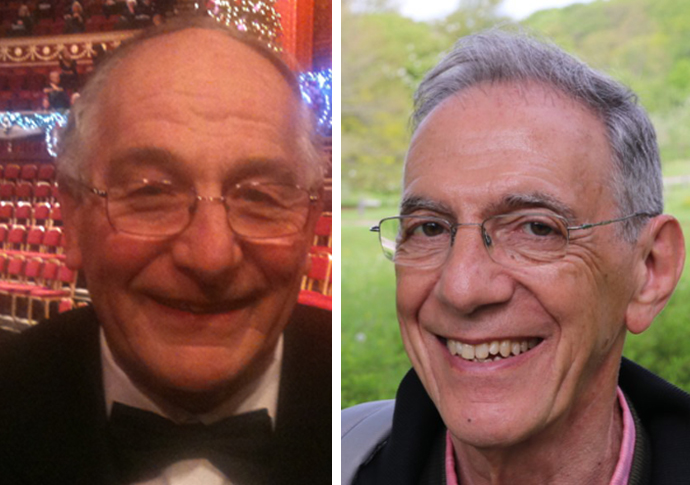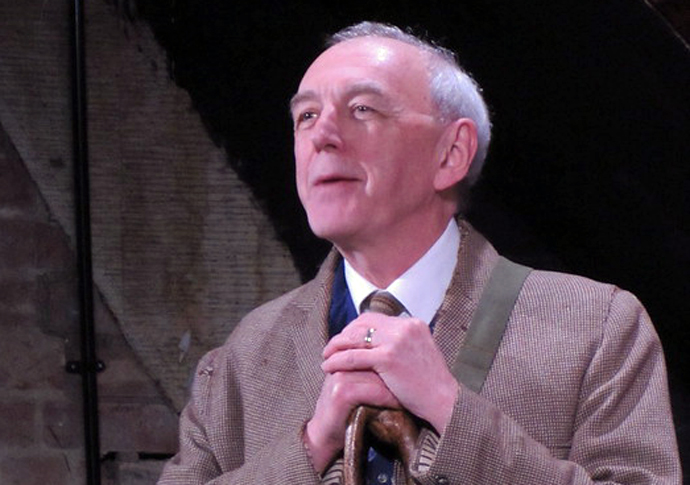Choral riffs
Choristers in evening dress may all look the same but at the annual Highgate Choral Society party, Michael Church discovered some hidden talents among his fellow basses
Friday, 3rd March 2023 — By Michael Church

Peter Warden and Gordon Wolffe
WHEN genial and avuncular Peter Warden popped up, armed with a guitar, in the middle of the Highgate Choral Society (HCS) party and launched into a Spinners song, one assumed this would be a routine piece of enthusiastic amateurism.
Forget it! I’ve seldom seen so immaculately calibrated a guitar technique, or one wedded to so warmly engaging a manner; this was the serenest professionalism.
“I’m a retired explorer,” he told me. “An engineer setting up oil rigs in the North Sea for Shell, and deciding where on the sea-bed the pipelines should go.”
How he gravitated to the HCS and simultaneously to the church choir at St Mary’s in Hendon is another story, but he’s happy to explain how he became a folk singer (and an in-house troubadour for Shell).
“I stumbled into folk music when I was 13, buying a banjo for a pound, a guitar for £4, and being given an old accordion by my aunt. I’m self-taught on all of them. I also got a Wheaton songbook with all the chords in it, and started singing songs the Spinners sang, and also Irish folk, in the days when every fourth pub had a folk club.
“I would learn three songs, and go along and sing them, and they’d say that’s great, can you come back next month? And I’d say OK, but I’ll have to learn three more songs.”
He then set up his own touring folk club, “staying in youth hostels and singing two or three times a week for the princely sum of £5 and a pint of beer”.
Gradually he got more serious: “I started listening to people like Tom Paxton, and singers who did much more complicated chord work. I’ve always played chords and bass runs on a steel-string guitar with a plectrum. I like doing gentle protest songs, not Woody Guthrie, more Pete Seeger. Bob Dylan I never warmed to. I liked Peter, Paul and Mary because they sang everybody else’s songs beautifully, so I sang a lot of those songs too.”
His standard repertoire would be a few protest songs, a few community songs, a few standards, maybe some Flanders and Swann, and finally a load of singalongs. And he did the same for his co-workers in Shell. Recently he’s been a volunteer driver for the Good Neighbours scheme for elderly people in Mill Hill. “And I do concerts for them as well. When I start singing, they do too, because they know all the words.”
And Peter has a message for his fellow choristers: “The idea that you can play rock and roll with three chords is quite true, but it does sound better if you can be a little more adventurous with your left hand. I no longer give lessons, but if anyone wants to know how to do it, send them to me and I’ll show them how to start.”
Huw Morgan

IT specialist Huw Morgan (above) is as Welsh as his name suggests, so no surprise that he should join a male-voice choir, then gravitate to the HCS. He had no formal musical training, and his outstanding tonal accuracy comes from a combination of memory plus long hours of practice. He has a big voice and formidable attack, but the dramatic monologue he delivered at the HCS’s summer party was subtly and exquisitely witty. How come?
“In the male-voice choir,” he says, “people did their party piece after concerts, but an actor performed the Battle of Hastings as a dramatic monologue. It was a 100 per cent historically correct, yet also very funny, and I thought it would be nice to have an excuse to learn it.”
It was written by Marriott Edgar, he says, he being the king of the dramatic-monologue art form: “Stanley Holloway performed so many of Marriott’s monologues that people think he wrote them.” And he gives me a sample stanza, with a lilt like Alan Bennett’s: “It has a beautiful rhythm, but it has to be performed with a Lancashire accent.”
Huw found a book of Edgar’s monologues, and also a tape with different actors doing their own version: “Thora Hird, Les Dawson, Roy Hudd, those sorts of people. I enjoyed performing them, and people seemed to enjoy hearing them. I could never sing a solo on stage, but this I knew I could do, as I do have a facility for acting. My daughter is the same – she’s also good at doing accents. I suppose it’s in our blood. You listen to other people doing these things, and you develop your own style.”
Huw’s performance, which brought the house down, was with a classic Edgar monologue which began…
On Jubilee Day the Ramsbottoms
Asked all their relations to tea,
Including young Albert’s grandmother
An awkward old party was she.
And ended with anguished shenanigans – shaking him, and using a bicycle pump – to recover a gold Jubilee sovereign which young Albert has inadvertently swallowed. After which Huw bursts into laughter: “Well, I like it anyway!”
Gordon Wolffe
Periodontist Gordon Wolffe first sang with a Handel society in the Netherlands and, on resettling in London and checking out choirs, chose to join the HCS. As a child he’d sung is his synagogue choir, and as a student he’d co-written and starred in a revue called Trial by Jewry.
His contribution to the HCS’s end-of-year bash consisted of a quintessentially music-hall top-hat turn, a baritone rendering of the Victorian ditty Ev’rybody knows me in My Old Brown Hat: the wit and perfection of his timing put him straight up there with the great comics of the past.
How did he acquire this gift? “Not in any way consciously. It wasn’t modelled on any one performer. I transposed the song for my vocal range, and just imagined I was on the stage 150 years ago.” Then he adds: “It must have been innate. But my family background must have helped.”
Then he sketches in that background, beginning with his great-grandfather Benzion Hoffman leaving what is today’s Ukraine in 1905 to escape the pogroms, and becoming the much-loved cantor and house composer at the Adath Yisrael synagogue in Green Lanes where his music was long sung. Benzion’s daughter and son-in-law Dinah and Simon Kaye fired their seven-year-old grandson Gordon with a love of opera by making him listen to a recording of Aida, then taking him to see it from the front row of the stalls at Covent Garden.
Gordon’s uncle Ernest, a brilliant pianist and composer, was another of his influences, while the family tree has long been – and remains – thickly peopled with professional instrumentalists, composers, and impresarios. The latter include Charles Kaye, who manages the World Orchestra for Peace, Simon Nathan – composer and orchestral arranger – and Simon’s opera singer brother Mark, who will be a soloist in a forthcoming HCS concert in the spring.
Many of Gordon’s relations had to flee pogroms in Russia and Ukraine; the Ukrainian town of Uman, where Benzion was born, was notorious for its anti-semitic massacres. One relation – an orchestral conductor – was murdered in a pogrom, but others survived thanks to miraculous escapes, or to dangerous westward journeys on foot or by train.
But in most cases the leitmotiv of these people’s lives was a sustaining love of music. And that is Gordon’s innate gift.
• Highgate Choral Society perform Bach’s St John Passion on Saturday March 11 at All Hallows Church, Savernake Road, NW3 2JP, 7pm. www.hcschoir.com/